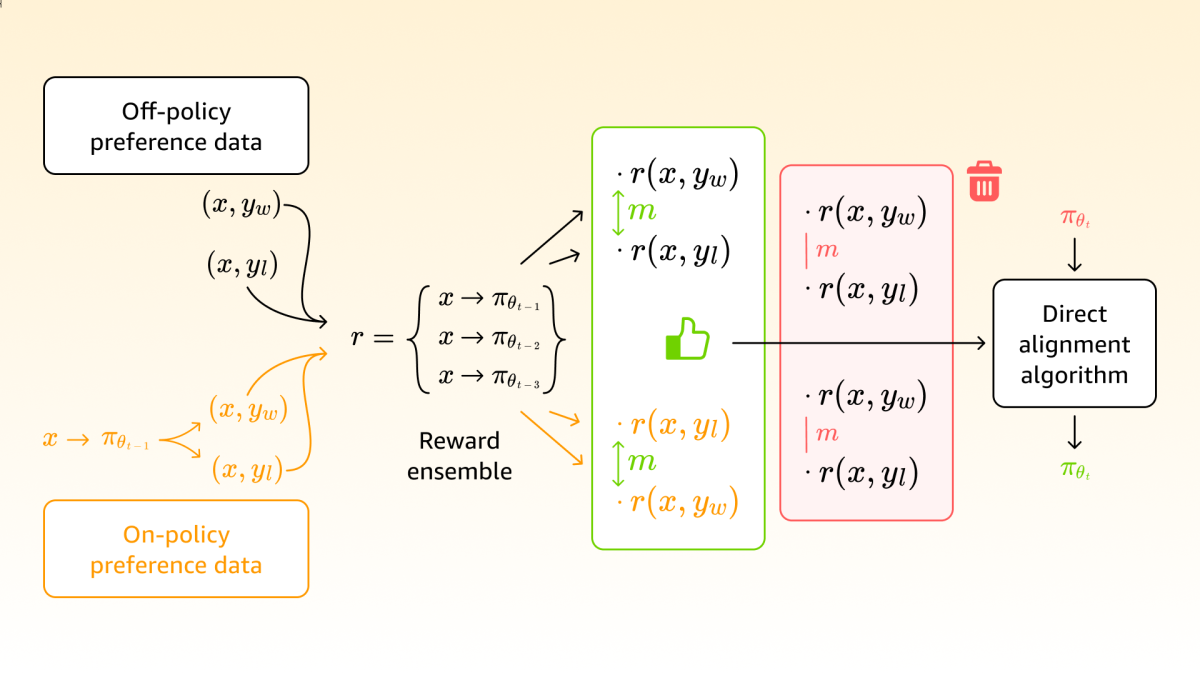Reinforcement learning with human feedback (RLHF) is the standard method for aligning large language models (LLMs) with human preferences — such as the preferences for nontoxic language and factually accurate responses. Recently, one of the most popular RLHF methods has been direct preference optimization, in which the LLM chooses between two output options, one of which has been labeled as preferred by a human annotator.
With direct preference optimization (DPO), however — and with other, similar direct-alignment algorithms — LLMs run the risk of learning spurious correlations from the data. In toxicity datasets, for instance, it’s common for the serious, thoughtful responses to be longer than the offensive responses. During RLHF, an LLM could thus learn to favor longer responses over shorter ones, which may not be preferable in general.
At this year’s International Conference on Learning Representations (ICLR), we presented a method for limiting such spurious correlations, which we call SeRA, for self-reviewing and alignment. First, after the first round of RLHF on human-annotated data, we use the LLM itself to generate additional training examples. Then we use the LLM’s output probabilities to assess the strength of preference for training pairs, keeping only those where the preferred response is strongly preferred.
To evaluate our approach, we compare a model trained using SeRA to three baseline models on four benchmark datasets. For each test input, we compare our model’s output to that of each of the baselines, and we use an off-the-shelf LLM to choose the better response. The SeRA-trained model’s win rate in these pairwise comparisons is higher than all three baselines’ across the board, sometimes by as much as 20% to 40%.
Direct preference optimization
Reinforcement learning is a trial-and-error method in which an agent interacts with the world and, depending on the actions it takes, receives greater or lesser rewards. Over time, the agent attempts to learn a policy that maximizes its cumulative reward.
In classical reinforcement learning, the interaction with the world can be literal: a robot, for instance, might receive a large reward for successfully navigating to a prescribed location and a negative reward for bumping into a wall. In RLHF, however, the reward depends on how well an LLM’s output aligns with a paradigm case specified by a human.
With traditional RLHF, the reward is calculated by a separate model, which is also trained on human-annotated data. But this is a time-consuming approach that doesn’t scale well. With DPO, there’s no need for a second model: the LLM receives the reward if it picks the human-preferred output and not if it doesn’t.
The drawback of DPO is that it treats all training pairs equally: the reward is the same whether the preferred output is strongly preferred or only mildly preferred. This increases the chances that the model will learn spurious correlations.
If, for instance, choosing strongly toxic responses incurred a greater penalty than choosing mildly toxic responses, the model could infer that toxicity — and not response length — was the relevant feature of the training examples. DPO irons out those differences; SeRA reintroduces them.
SeRA
With SeRa, we first perform conventional DPO, using a dataset of human-annotated example pairs. After this first pass through the data, the LLM has learned something about the types of outputs that humans prefer.
We then use the updated model to generate a new set of training examples. For every generated response pair, we assign each response a preference score, which is based on the updated model’s probability of generating that response. We then keep only those pairs in which the preferred response scores significantly higher than the non-preferred response.

Using the same metric, we next filter the data in the original, human-annotated dataset. Then we combine filtered samples from the original dataset with filtered samples from our new, generated dataset and perform DPO once again. This process repeats, with the generated samples constituting a larger and larger fraction of the dataset, until model performance converges.
The intuition here is that if a dataset is designed to represent some contrast, but it also contains spurious correlations, then the intended contrast — between, say, toxic and non-toxic data — will be significantly greater than the unintended contrast — between, say, long and short responses.
This assumption held for the four benchmark datasets we used to evaluate our method, and we think that it’s a plausible assumption for other spurious correlations. But there could be instances in which it doesn’t hold, so in applications of the SeRA method, the model’s convergence behavior should be monitored.
While we used DPO in our experiments, in our paper, we also demonstrate how to generalize our method to other direct-alignment algorithms. Finally, there’s some risk that, when using model-generated data to train a model, we could get into a feedback loop where the model overamplifies some aspect of the initial dataset. As a consequence, in each pass through the data, the model’s reward is based not only on the current iteration but on past iterations as well, to ensure continuity in the characteristic features of the training data.
Acknowledgments: Sravan Bodapati




















